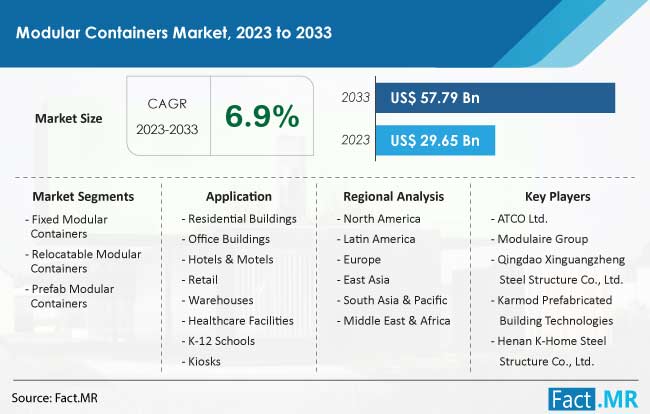In the ever-changing landscape of construction, transportation, and storage, modular containers have emerged as a transformative solution that combines flexibility, sustainability, and functionality. These innovative structures have revolutionized industries by offering versatile, customizable, and cost-effective spaces.
Download Sample Copy of This Report:
https://www.factmr.com/connectus/sample?flag=S&rep_id=6373?AS
The Rise of Modular Containers
Modular containers, also known as shipping containers or conex boxes, were originally designed for transporting goods across the globe. However, their inherent structural integrity, standardized dimensions, and ease of transportation have led to their adaptation for various applications beyond shipping.
Applications Across Industries
- Construction: Modular containers have found a niche in construction, serving as on-site offices, storage units, and even fully functional living spaces. Their portability and ease of setup make them ideal for temporary or remote construction sites.
- Retail and Pop-Up Stores: The retail industry embraces modular containers for creating pop-up shops and unique brand experiences. These containers offer a customizable and cost-efficient way to showcase products in creative environments.
- Housing Solutions: Modular containers are being repurposed into modern, sustainable homes and apartments. This approach provides affordable and environmentally friendly housing options.
- Event Spaces: From concerts and festivals to trade shows and exhibitions, modular containers offer quick and adaptable event spaces that can be easily transported and customized.
- Emergency and Disaster Relief: In times of crisis, modular containers provide quickly deployable structures for medical clinics, shelters, and supply storage.
Benefits of Modular Containers
- Cost-Efficiency: The reuse of shipping containers reduces material costs, and their prefabricated nature accelerates construction timelines, leading to cost savings.
- Speed and Mobility: Modular containers are easily transportable, enabling rapid deployment and relocation as needed.
- Sustainability: Repurposing containers decreases waste and the need for new materials, aligning with sustainable building practices.
- Design Flexibility: Containers can be customized with various layouts, windows, doors, insulation, and utilities to suit specific needs.
- Durability and Security: The robust design of shipping containers provides secure and weather-resistant spaces.
Innovations and Future Trends
- Multi-Container Structures: Stacking and combining multiple containers create larger and more intricate structures, enabling unique architectural designs.
- Smart Container Solutions: Integration of technology, such as solar panels and IoT devices, enhances energy efficiency and connectivity.
- Sustainable Design: Advancements in eco-friendly materials and energy-efficient solutions will further enhance the sustainability of modular containers.
- Hybrid Applications: Combining traditional construction methods with modular containers opens doors to versatile and innovative building solutions.
Conclusion
The modular containers industry has proven its adaptability and potential across diverse sectors. From creating efficient living spaces to offering dynamic retail environments, modular containers represent a paradigm shift in how we approach construction, logistics, and design. As the industry continues to evolve with technological advancements and sustainable practices, the influence of modular containers on the way we build, live, and interact with our surroundings will only continue to grow.
